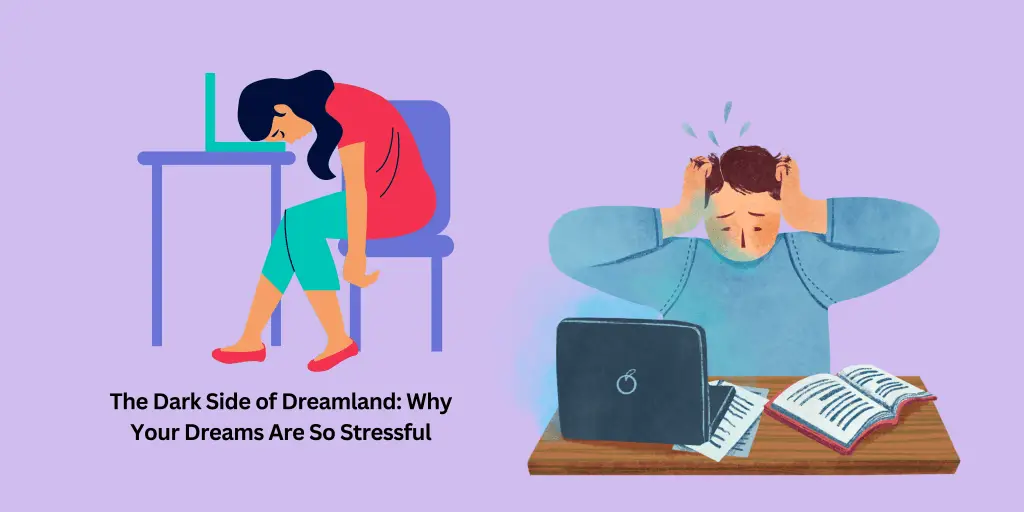
Dreams can be a source of stress for many people. Whether it’s nightmares, recurring dreams, or just feeling anxious while dreaming, the experience can be overwhelming and uncomfortable.
But why are our dreams so stressful?
The answer lies in our subconscious mind. Dreams are often a reflection of our innermost thoughts and feelings that we may not even be aware of during waking life.
Our unconscious mind is constantly processing information from the day-to-day events we encounter – both good and bad – as well as any unresolved issues or emotions we may have been holding onto for some time now.
As such, when these thoughts come to the surface in dream form they can feel quite intense and overwhelming because they’re coming from deep within us without any conscious control over them.
Another reason why dreams might feel stressful is that they often represent an escape from reality into another world where anything goes – including fear!
In this way, dreaming allows us to confront fears that would otherwise remain hidden away in our subconscious minds if left unchecked; thus making them more difficult to manage when awake due to their intensity level being much higher than normal everyday worries or concerns.
This could explain why some people find themselves having nightmares on a regular basis – their unconscious mind is trying its best to process all those unresolved issues but it’s too much for them to handle consciously so instead it manifests itself through dream imagery which feels very real at times!
The stress levels tend to increase during REM sleep (the stage where most vivid dreaming occurs) due to increased activity in certain parts of your brain such as the amygdala which helps regulate emotionality & arousal levels;
This means you’ll likely experience heightened states of fear & anxiety while dreaming compared with other stages throughout your sleep cycle like non-REM sleep cycles where there isn’t as much activity going on inside your head!
All this combined makes sense then why sometimes dreams seem more intense than usual and leave us feeling stressed out afterward…it’s simply part & parcel with how complexly intertwined mental health/emotional well-being truly are!
What are the Causes of Stressful Dreams?
One of the most common causes of stress in dreams is unresolved issues from our waking life.
Dreams often reflect our innermost thoughts and feelings, which means that any unresolved worries or anxieties we have during the day may manifest themselves in our nighttime visions.
It could be anything from work-related stress to relationship problems; if something has been bothering us for some time then it’s likely to show up in our dreams as well.
Another cause of stressful dreaming could simply be an overactive imagination! Our minds are powerful things and sometimes they take on a life of their own when we sleep – creating vivid scenarios that feel very real while we’re dreaming them but make no sense once we wake up again!
This type of dream tends to happen more frequently when people are under pressure or dealing with difficult emotions such as fear or sadness; these intense feelings can lead us into strange dream worlds where anything seems possible (and usually quite scary!).
Also, certain medications can also trigger nightmares and other types of disturbing dreams – especially those used for treating depression or anxiety disorders.
If this sounds familiar then it might be worth talking to your doctor about changing your medication if possible; there may even be natural remedies available that could help reduce any negative side effects without compromising on effectiveness.
What is the mystery behind Stressful Dreams?
The first thing to consider is that our brains process information differently when we’re asleep than when we’re awake.
When we sleep, the brain shifts into a state where it can more easily access memories from both recent and distant past experiences.
This means that during REM (rapid eye movement) sleep, which is the deepest stage of sleep, your brain may be replaying events or situations from your life in an effort to make sense of them.
It’s also important to note that while dreaming, our subconscious minds take over and create stories based on what’s been going on in our lives lately – including any unresolved issues or worries we may have about something specific or just general anxiety about life in general.
So if you’ve been dealing with stress recently it could very well show up as a nightmare once you drift off into slumberland!
Some experts believe that nightmares are actually beneficial for helping us work through difficult emotions such as fear or anger by allowing us to confront these feelings without being overwhelmed by them while awake.
In other words: facing those scary monsters head-on might be exactly what your mind needs for healing!
Whatever the cause behind your stressful dreams may be – understanding their origin can help give insight into how best to deal with them moving forward so don’t hesitate to reach out for professional help if needed!
How to Cope with a Stressful Dream?
Dreams can be a source of stress and anxiety, but it doesn’t have to be that way. There are some simple steps you can take to help cope with stressful dream experiences.
First, try to identify the cause of your stress in the dream. Was there something specific that made you feel anxious?
Once you’ve identified what was causing your distress, it’s important to remember that dreams don’t always reflect reality; they’re often symbolic or metaphorical representations of our inner thoughts and feelings.
Understanding this will help put things into perspective and make them less overwhelming.
Second, practice relaxation techniques before bedtime such as deep breathing exercises or meditation which can reduce overall levels of stress and tension in the body while also helping clear away any negative thoughts lingering from earlier in the day which may lead to more intense dreams at night time.
Finally, if possible talk about your experience with someone else who is understanding and supportive – sharing how we feel helps us process our emotions better so we don’t get stuck ruminating on them for too long afterward!
Discovering Ways to Reduce Dream-Related Anxiety
Dreams can be a source of stress and anxiety, but there are ways to reduce dream-related anxiety.
One way is to keep a dream journal. Writing down your dreams can help you gain insight into the emotions and experiences that may be causing your stress or fear in the first place.
Additionally, it allows you to reflect on how these feelings have impacted your life so far and what steps you can take going forward to address them.
Another way to reduce dream-related anxiety is through relaxation techniques such as meditation or yoga. These activities will help calm both body and mind, allowing for better sleep quality which in turn reduces nightmares or other stressful dreams from occurring during the night.
Finally, talking with friends or family about any issues that may arise from dreaming can also provide relief from anxious thoughts related to dreaming scenarios.
It’s important not only for emotional support but also because they might offer helpful advice on how best to deal with any anxieties experienced due to dreaming episodes!
Conclusion
Many people have probably witnessed or heard of people suffering from nightmares or other dream-related anxieties.
While there is no single cause of this distress, understanding the source of these feelings and learning to cope with them can help reduce any stress caused by dreaming episodes.
This includes determining what is causing your fear in the first place, practicing relaxation techniques before bedtime, and discussing any issues that may arise from dreaming with supportive people.
Using these methods to address dream-related anxieties can result in improved overall sleep quality and a more relaxed state of mind.








